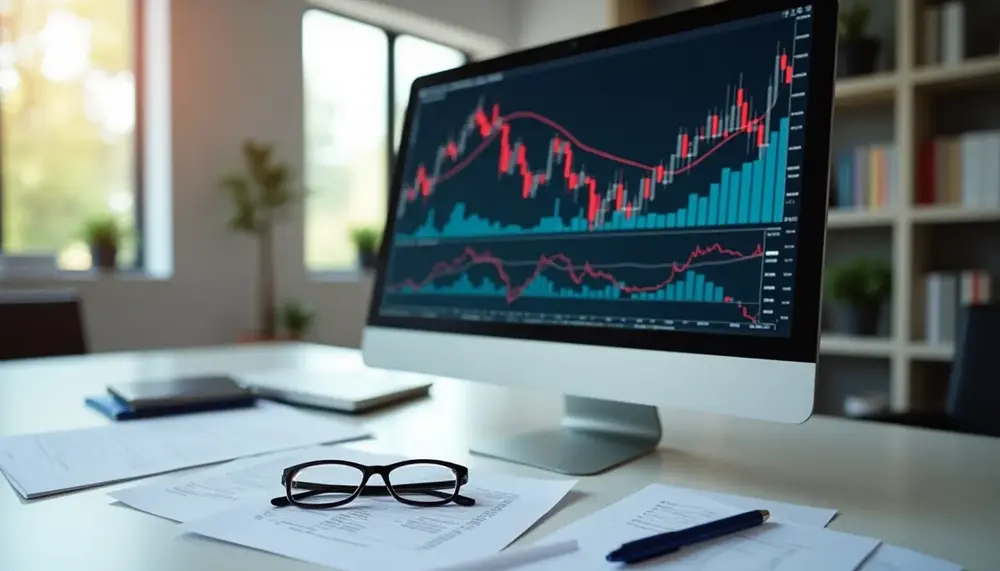Derivatives
Derivatives
Understanding the Term: Derivatives
In the field of trading, the term derivatives may sound complex, but it's an important concept to grasp. Derivatives are essentially financial contracts, whose value is derived from an underlying asset. These underlying assets can include stocks, bonds, commodities, currencies, interest rates, and market indexes.
The Basics: How Do Derivatives Work?
Let's break this down a bit further. Consider a derivative as a bet. You're making a deal based on the future price of the underlying asset. For instance, when you buy a stock option (a form of derivative), you're not buying the actual stock. Instead, you are buying the right to purchase the stock at a future date at a set price. The value of this option – the derivative – will change as the value of the underlying stock rises or falls.
The Two Main Types of Derivatives
Generally, derivatives fall into two categories: futures/forwards and options. Futures and forwards are contracts to buy or sell an asset at a future date for a price agreed upon today. The difference? Futures are traded on exchanges, while forwards are private agreements between two parties. Options give the holder the right, but not the obligation, to buy or sell an asset at a set price, up to a future date.
Why Use Derivatives in Trading?
So, why would traders use derivatives? The two primary uses are hedging risk and speculating on future prices. Hedging helps to protect against future price changes, a useful tool in volatile markets. Speculating, on the other hand, allows traders to profit from betting on which way prices will move.
Risks and Rewards of Trading Derivatives
Derivatives trading can offer high reward potential. With a relatively small investment, you can control assets that have a much larger value. However, this leverage also magnifies the risk. It's possible to lose significantly more than your initial investment. Therefore, understanding the risk-to-reward ratio of derivatives is crucial for any trader.
Conclusion on Derivatives
Derivatives form an essential part of modern trading, offering opportunities for risk management and speculative profit. However, they're not for the inexperienced or risk-averse. Like any other trading tool, understanding the functionality, risks, and rewards of derivatives is crucial to successful trading.
Blog Posts with the term: Derivatives

Bitfinex is a sophisticated cryptocurrency trading platform offering advanced tools and features for professional traders, including margin trading, derivatives, lending markets, and high liquidity. The guide provides an in-depth look at Bitfinex's functionalities such as customizable interfaces, diverse order types,...

LedgerX is a regulated financial platform established in 2013 that offers cryptocurrency derivatives such as options, futures, and swaps to both retail and institutional investors. It provides a secure trading environment with features like mini contracts and physical settlement, catering...

Insider trading involves using non-public, material information to trade securities and can be legal if conducted transparently or illegal when exploiting unfair advantages. Legal insider trading requires adherence to disclosure rules, while illegal cases like Rajaratnam's Galleon scandal highlight severe...

Crypto trading, which involves buying and selling cryptocurrencies like Bitcoin and Ethereum, is being examined for its compatibility with Islamic finance principles. The key question is whether crypto trading can be considered 'halal' (permissible under Islamic law), given that it...

market price. Futures contracts allow traders to speculate on the future price movements of cryptocurrencies and potentially profit from them. Understanding Crypto Options Options, on the other hand, give the buyer the right but not the obligation to buy or sell a...

dYdX is a decentralized exchange (DEX) on the Ethereum blockchain offering advanced trading options like spot, margin trading, and derivatives without intermediaries. It features an order book model for price matching, leverages off-chain order books with on-chain settlement using StarkWare’s...

Leveraging ETFs is a strategy that allows investors to enhance their exposure to a particular market or asset class. By borrowing funds to increase investment capital, investors can potentially amplify returns. However, leveraging also comes with increased risk and the...

ByBit is a cryptocurrency derivatives exchange launched in 2018, offering tools and features for both novice and experienced traders to enhance their trading strategies. It differentiates itself with leveraged trading options, an advanced order system, high-performance matching engine, comprehensive customer...

Binance is a leading global cryptocurrency exchange offering tools for both beginners and experienced traders, with features like spot trading, futures, margin trading, staking, Launchpad token offerings, and a mobile app. The platform emphasizes user-friendliness in its interface design and...

This article discusses the difference between investing and trading in the financial markets. It explains that investing is a long-term strategy focused on gradual wealth accumulation, while trading is a short-term approach aimed at profiting from price fluctuations. The article...

OKX is a cryptocurrency trading platform that caters to both new and experienced traders with an intuitive interface, educational resources, and various trading options including spot, futures, and DeFi applications. The exchange emphasizes user security through account verification processes such...

Smart Contracts are an important part of crypto trading as they are self-executing contracts written in lines of code on a decentralized blockchain network. They provide security, speed, and trust in transactions, and are being used in various sectors such...

Emirex is a comprehensive digital asset exchange and investment platform that integrates blockchain technology into financial services, offering secure trading of cryptocurrencies, tokenized commodities, and security tokens. The platform emphasizes user experience with an intuitive interface, advanced trading tools, robust...

Bitcoin margin trading involves borrowing funds to increase buying power, amplifying both potential profits and losses. Traders must understand leverage ratios, maintain initial and maintenance margins in their accounts, and manage the high risks associated with cryptocurrency's volatility....

The U.S. regulatory framework for Bitcoin trading is complex, with multiple federal agencies like the SEC, CFTC, and FinCEN involved in creating guidelines that impact taxation, securities classification, and anti-money laundering efforts; state-level regulations vary widely. Recent legislative initiatives aim...

